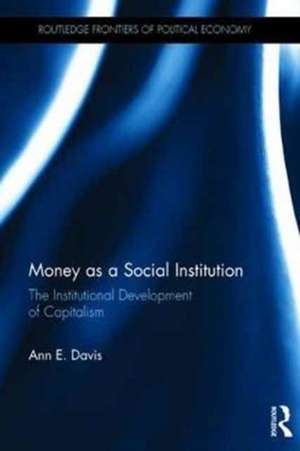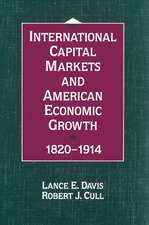Money as a Social Institution: The Institutional Development of Capitalism: Routledge Frontiers of Political Economy
Autor Ann Davisen Limba Engleză Hardback – 8 iun 2017
This book offers an interpretation of money as a social institution. Money provides the link between the household and the firm, the worker and his product, making that very division seem natural and money as imminently practical. Money as a Social Institution begins in the medieval period and traces the evolution of money alongside consequent implications for the changing models of the corporation and the state. This is then followed with double-entry accounting as a tool of long-distance merchants and bankers, then the monitoring of the process of production by professional corporate managers. Davis provides a framework of analysis for examining money historically, beyond the operation of those particular institutions, which includes the possibility of conceptualizing and organizing the world differently.
This volume is of great importance to academics and students who are interested in economic history and history of economic thought, as well as international political economics and critique of political economy.
| Toate formatele și edițiile | Preț | Express |
|---|---|---|
| Paperback (1) | 353.57 lei 6-8 săpt. | |
| Taylor & Francis – 18 apr 2019 | 353.57 lei 6-8 săpt. | |
| Hardback (1) | 1108.37 lei 6-8 săpt. | |
| Taylor & Francis – 8 iun 2017 | 1108.37 lei 6-8 săpt. |
Din seria Routledge Frontiers of Political Economy
-
 Preț: 309.90 lei
Preț: 309.90 lei -
 Preț: 309.79 lei
Preț: 309.79 lei -
 Preț: 316.03 lei
Preț: 316.03 lei -
 Preț: 310.55 lei
Preț: 310.55 lei - 9%
 Preț: 866.82 lei
Preț: 866.82 lei -
 Preț: 311.87 lei
Preț: 311.87 lei -
 Preț: 311.61 lei
Preț: 311.61 lei -
 Preț: 286.99 lei
Preț: 286.99 lei -
 Preț: 327.83 lei
Preț: 327.83 lei -
 Preț: 386.12 lei
Preț: 386.12 lei - 9%
 Preț: 938.48 lei
Preț: 938.48 lei -
 Preț: 302.76 lei
Preț: 302.76 lei -
 Preț: 151.97 lei
Preț: 151.97 lei -
 Preț: 318.54 lei
Preț: 318.54 lei -
 Preț: 317.95 lei
Preț: 317.95 lei -
 Preț: 310.01 lei
Preț: 310.01 lei -
 Preț: 326.49 lei
Preț: 326.49 lei -
 Preț: 155.44 lei
Preț: 155.44 lei -
 Preț: 309.79 lei
Preț: 309.79 lei -
 Preț: 152.67 lei
Preț: 152.67 lei -
 Preț: 328.76 lei
Preț: 328.76 lei -
 Preț: 281.72 lei
Preț: 281.72 lei -
 Preț: 286.58 lei
Preț: 286.58 lei -
 Preț: 325.09 lei
Preț: 325.09 lei -
 Preț: 353.78 lei
Preț: 353.78 lei -
 Preț: 371.95 lei
Preț: 371.95 lei -
 Preț: 310.95 lei
Preț: 310.95 lei -
 Preț: 324.87 lei
Preț: 324.87 lei -
 Preț: 312.86 lei
Preț: 312.86 lei -
 Preț: 374.16 lei
Preț: 374.16 lei -
 Preț: 329.09 lei
Preț: 329.09 lei -
 Preț: 348.22 lei
Preț: 348.22 lei - 28%
 Preț: 1047.06 lei
Preț: 1047.06 lei - 18%
 Preț: 1169.45 lei
Preț: 1169.45 lei - 18%
 Preț: 1555.17 lei
Preț: 1555.17 lei - 18%
 Preț: 1048.43 lei
Preț: 1048.43 lei - 18%
 Preț: 1059.84 lei
Preț: 1059.84 lei - 31%
 Preț: 767.47 lei
Preț: 767.47 lei - 18%
 Preț: 731.92 lei
Preț: 731.92 lei - 26%
 Preț: 822.54 lei
Preț: 822.54 lei - 18%
 Preț: 1796.21 lei
Preț: 1796.21 lei - 26%
 Preț: 1184.91 lei
Preț: 1184.91 lei - 18%
 Preț: 1120.23 lei
Preț: 1120.23 lei - 15%
 Preț: 700.95 lei
Preț: 700.95 lei - 18%
 Preț: 1116.31 lei
Preț: 1116.31 lei - 22%
 Preț: 299.52 lei
Preț: 299.52 lei - 18%
 Preț: 999.46 lei
Preț: 999.46 lei
Preț: 1108.37 lei
Preț vechi: 1351.68 lei
-18% Nou
Puncte Express: 1663
Preț estimativ în valută:
212.12€ • 220.63$ • 175.11£
212.12€ • 220.63$ • 175.11£
Carte tipărită la comandă
Livrare economică 12-26 aprilie
Preluare comenzi: 021 569.72.76
Specificații
ISBN-13: 9781138945869
ISBN-10: 1138945862
Pagini: 208
Ilustrații: 8
Dimensiuni: 156 x 234 x 17 mm
Greutate: 0.43 kg
Ediția:1
Editura: Taylor & Francis
Colecția Routledge
Seria Routledge Frontiers of Political Economy
Locul publicării:Oxford, United Kingdom
ISBN-10: 1138945862
Pagini: 208
Ilustrații: 8
Dimensiuni: 156 x 234 x 17 mm
Greutate: 0.43 kg
Ediția:1
Editura: Taylor & Francis
Colecția Routledge
Seria Routledge Frontiers of Political Economy
Locul publicării:Oxford, United Kingdom
Public țintă
Postgraduate and UndergraduateCuprins
Chapter One. Introduction and Selected Review of the Literature
Chapter Two. Money as a Social Institution
Chapter Three. The Economy as Labor Exchange Mediated by Money
Chapter Four. Long-Term History of Money and the Market
Chapter Five. Money and the Evolution of Institutions and Knowledge
Chapter Six. Fetishism and Financialization
Chapter Seven. Money and Abstraction
Chapter Eight. Conclusion
Chapter Two. Money as a Social Institution
Chapter Three. The Economy as Labor Exchange Mediated by Money
Chapter Four. Long-Term History of Money and the Market
Chapter Five. Money and the Evolution of Institutions and Knowledge
Chapter Six. Fetishism and Financialization
Chapter Seven. Money and Abstraction
Chapter Eight. Conclusion
Descriere
This book offers an interpretation of money as a social institution. Money provides the link between the household and the firm, the worker and his product, making that very division seem natural and money as imminently practical.Money as a Social Institution begins in the medieval period, and traces the evolution of money alongside consequent implications for the changing models of the corporation and the state. This is then followed with a double-entry accounting as a tool of long distance merchants and bankers; then the monitoring of the process of production by professional corporate managers.



















